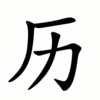历
Hello, you have come here looking for the meaning of the word 历. In DICTIOUS you will not only get to know all the dictionary meanings for the word 历, but we will also tell you about its etymology, its characteristics and you will know how to say 历 in singular and plural. Everything you need to know about the word 历 you have here. The definition of the word 历 will help you to be more precise and correct when speaking or writing your texts. Knowing the definition of历, as well as those of other words, enriches your vocabulary and provides you with more and better linguistic resources.
| ||||||||
Translingual
| Stroke order | |||
|---|---|---|---|
| Stroke order | |||
|---|---|---|---|

| |||
| Traditional | 歷 |
|---|---|
| Shinjitai | 歴 |
| Simplified | 历 |
| Traditional | 曆 |
|---|---|
| Shinjitai | 暦 |
| Simplified | 历 |
Han character
历 (Kangxi radical 27, 厂+2, 4 strokes, cangjie input 一大尸 (MKS) or 難一大尸 (XMKS), four-corner 7122, composition ⿸厂力)
Derived characters
References
- Kangxi Dictionary: not present, would follow page 160, character 18
- Hanyu Da Zidian (first edition): volume 1, page 68, character 4
- Unihan data for U+5386
Chinese
Glyph origin
Simplified from 歷 and 曆 by keeping the character's basic structure but replacing the components under 厂 with phonetic 力 (lì).
Etymology 1
| For pronunciation and definitions of 历 – see 歷 (“to experience; to go through; to undergo; experience; history; record; etc.”). (This character is the simplified form of 歷). |
Notes:
|
Etymology 2
| For pronunciation and definitions of 历 – see 曆 (“calendar”). (This character is the simplified form of 曆). |
Notes:
|